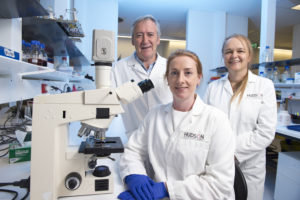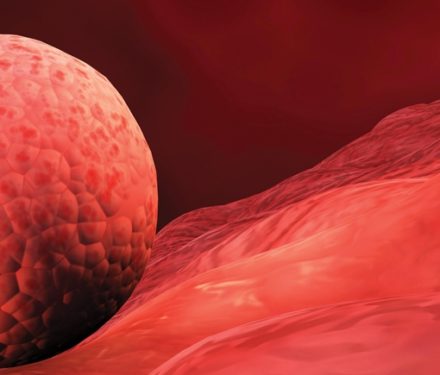Protein found in female reproductive tract could halt HIV spread
Scientists from Hudson Institute of Medical Research and Deakin University have shown that a naturally occurring signalling protein found in the female reproductive tract, interferon epsilon, can block the replication of human immunodeficiency virus (HIV) in human cells, and could form a first-line response to the virus.

The findings of this collaborative study have recently been published in the Nature Publishing Group journal, Immunology and Cell Biology.
In the study, Professor Paul Hertzog’s team in the Centre for Innate Immunity and Infectious Diseases at Hudson Institute and Professor Johnson Mak’s team at Deakin University pre-treated human cell lines with a rare and pure interferon epsilon, then infected the cells with HIV. The results were exciting.
“We showed that interferon epsilon reduces HIV viral replication in human cell lines and induces many of the mechanisms that are known to block HIV infection. This protection occurred at several stages across the replication cycle of the virus,” Dr Niamh Mangan, a Fielding Foundation Fellow at Hudson Institute said.
“The wonderful thing about interferon epsilon is that it’s made naturally by the body. It boosts natural immunity. We know it acts quickly, we know it acts effectively and we know it’s there all the time in the reproductive tract of pre-menopausal women. Boosting the levels of this protein could help to protect women against HIV infection.”
Interferon may protect women against HIV
Interferon epsilon is regulated by the hormones estrogen and progesterone, meaning its levels fluctuate throughout a menstrual cycle. Susceptibility to HIV is higher when interferon epsilon levels are low, and the study indicates that this cytokine may help to protect against HIV infection in women.
Professor Johnson Mak, Chair in Infectious Diseases at Deakin University’s School of Medicine and a global authority on HIV, said stopping the spread of HIV after transmission is a major challenge globally, and more treatment options are needed, particularly in developing countries, where strategies to prevent HIV transmission are limited.
“Interferon epsilon could have a significant impact on preventing the transmission of HIV and opens up new strategies to prevent transmission,” Professor Mak said.
“Current HIV prevention strategies, such as Pre-Exposure Prophylaxis (PrEP) with anti-retroviral drugs, primarily attack the virus by chemical means, while interferon epsilon works on the HIV virus differently by taking advantage of our natural immune system to suppress viral replication.
“These new findings could open the door to developing new, safer female-administered HIV prevention strategies, such as a locally administered gel, or microbicide, to boost a woman’s natural levels of interferon epsilon and protect female populations that are vulnerable to HIV infection against the virus,” he said.
Interferon boosts the body’s natural protection
Professor Paul Hertzog’s laboratory discovered the gene encoding interferon epsilon and were the first to characterise the cytokine in 2013, demonstrating its protection against sexually transmitted infections such as chlamydia and herpes simplex virus infection in mouse models.
Interferon epsilon was shown to act by boosting the body’s natural protective mechanisms. This provided the impetus to study its role in infections of the human reproductive tract such as HIV. The findings have implications for the spread of other sexually transmitted infections, including Zika virus, which is linked to an unprecedented increase in the birth of babies born with microcephaly.
“The next part of this study likely be further characterisation of the interaction between the HIV virus and cells. We would also like to look at the impact of interferon epsilon on other stages of the HIV life cycle, including its role in latent infection,” Dr Mangan said.
Collabroators | Australian Centre for HIV and Hepatitis Virology Research, National Health and Medical Research Council, Bill and Melinda Gates Foundation
Contact us | Hudson Institute communications | t: +61 3 8572 2697 e: communications@hudson.org.au



